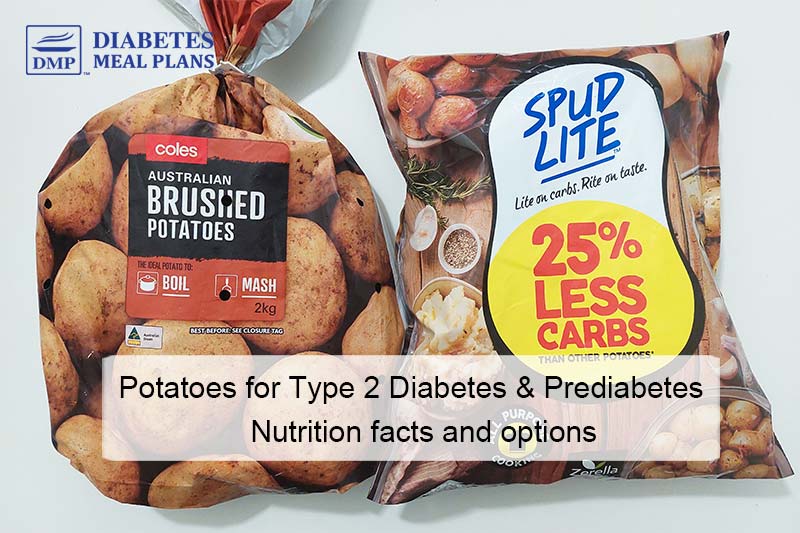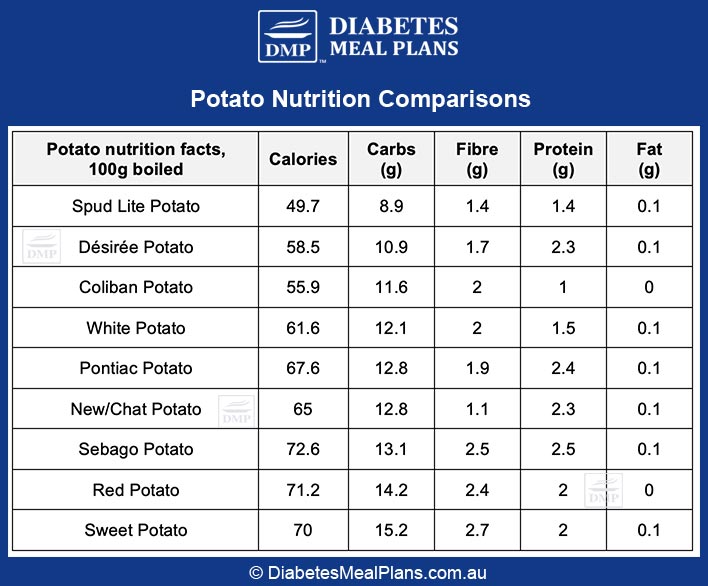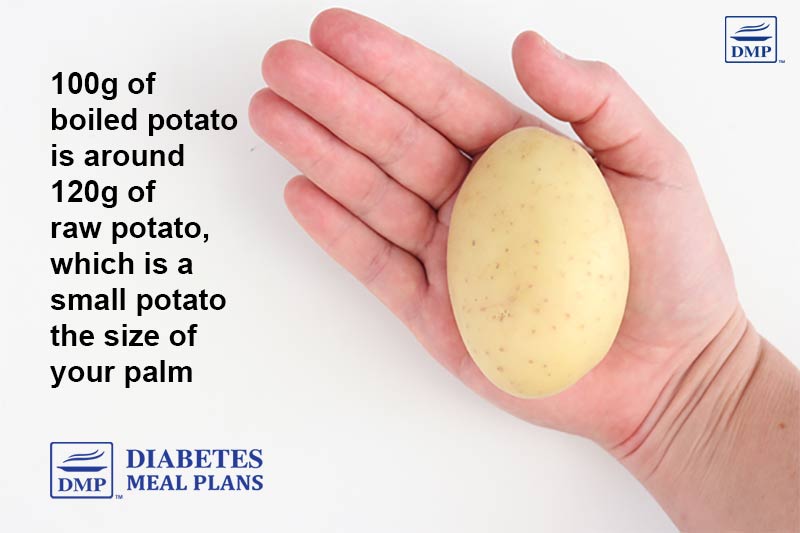Table of Contents[Hide][Show]
Potatoes have been a staple in many diets across the globe. But when it comes to diabetes, you may be wondering whether potatoes are good or bad.
To be up front, our recommendation is to avoid potatoes, as they’re too high in carbs to be a diabetes friendly food.
Let’s look closer at the nutrition facts and different options so you can see for yourself.

Potato Nutrition Facts
Potatoes are starchy vegetables, high in carbohydrates and low in fibre. This combination is known to make it more difficult to manage your diabetes.
Quick facts:
- A medium potato contains around 163 calories and around 30-35g of carbohydrates.
- Potatoes generally have a medium-high glycaemic index (GI), ranging from 60 to 111!
- Potatoes do contain micronutrients such as potassium, vitamin C, vitamin B6, and manganese. However, the high carbohydrate content outweighs these benefits, and these nutrients can be found in other foods that are better to choose.
Potato Nutrition Comparisons
There are over 200 varieties of potatoes to choose from, offering diverse flavours and textures. In Australia are stores offer some standard varieties such as new potatoes (chat potatoes), red and white potatoes, desiree, sebago (most common for brushed potatoes) and potiac potatoes, and sweet potatoes.
A new player on the market is the Spud Lite potato, which are a bit lower in carbs compared to other potatoes.
Take a look at the chart below, which compares the nutrition facts.

100 grams of boiled potato, will be around 120 grams for raw potato. This is because potatoes can lose approximately 20% of their weight due to water loss during boiling (or other cooking methods). It’s important to note that this is just an estimate, and the actual weight may vary based on the specific potato and boiling time.
This is what 120 grams of raw potato looks like in terms of size.

As we said above, our recommendation is to avoid potatoes, as they’re too high in carbs to be a diabetes friendly food.
This is especially the case if you’re struggling to lower or maintain healthy blood sugar levels – eating potatoes will make it more difficult.
Research on Potatoes and Diabetes
There isn’t any evidence to support potatoes as a healthy food for people with diabetes.
- A small study compared the impact of 50 grams carbohydrate portion of potatoes, bread, and pasta on participants’ blood sugar levels. The results showed that potatoes caused the most significant blood sugar rise at the 2-hour mark compared to bread and pasta.
- Another study found that when healthy individuals consumed mashed potatoes alone, the hunger hormone ghrelin increased, leading to more hunger. In contrast, when participants consumed fat alone, the hunger hormone ghrelin decreased, resulting in less hunger. This suggests that replacing carbohydrates with healthy fat sources improves measures of glycemic control.
- An older study by the American Diabetes Association compared the ingestion of sugar versus cooked potatoes. Participants were given 50 grams of glucose (pure sugar) and later 250 grams of potatoes (equivalent to 50 grams of carbs). The researchers found that pure sugar had nearly the same impact on blood sugar levels as potatoes – 8.8 mmol/L versus 8.0 mmol/L. This highlights the importance of being mindful of all carbohydrate intake – it is the nutrient that will have the biggest influence on blood sugar levels.
In terms of prediabetes, a number of studies (1, 2, 3, 4, 5) suggest that low intake of potato may be okay (for instance one serve a day), but each serving was associated with an increased risk of type 2 diabetes; and intake of French fries (processed potato) presented an even greater risk for developing type 2 diabetes.
In general one serve of any vegetable is around 75g. In terms of potato that is a small amount.
FAQs
Can diabetics eat boiled potatoes?
100g of potatoes ranges from around 9-15 grams of carbohydrate – as you can see by the chart above, which includes the nutrition facts for boiled potatoes. All potatoes are high in carbs and generally have a medium-high glycemic index.
Can diabetics eat potato chips?
28g of potato chips is about 10 to 15 chips, and contains about 15g of carbohydrates. We recommend avoiding most potato chips for better blood sugar control.
You can read more about potato chips here.
Isn’t the resistant starch in potatoes healthy?
While resistant starch offers health benefits like improved glycemic control, potatoes still contain a significant amount of digestible carbohydrates that can lead to blood sugar spikes, so in general we recommend people do avoid or minimise their intake of potatoes.
It is better to get fibre from non-starchy vegetables, nuts, and seeds while keeping overall carbohydrate intake low. However, if you want to test it yourself you need to cook and cool the potatoes to increase the resistant starch.
For example, cook the potatoes, leave them in the fridge overnight and then reheat. This will increase the resistant starch, which does provide more health benefits than eating them straight away.
Is sweet potato good for diabetics?
As you can see in the chart above, sweet potatoes have the highest amount of carbohydrate content compared to other potato varieties.
Sweet potatoes do contain antioxidants like carotene, which may provide anti-inflammatory benefits. However, you can increase your carotene intake without the high carb content, by choosing other orange vegetables such as carrots and tomatoes.
If you boil sweet potatoes they do have a lower glycemic index (GI), around 45; but if you bake them the GI is around 85 – very high!
Recommendation on Potatoes for Diabetes
As we said above, our recommendation is to avoid potatoes, as they’re too high in carbs to be a diabetes friendly food.
This is especially the case if you’re struggling to lower or maintain healthy blood sugar levels – eating potatoes will make it more difficult.
There are alternatives for potato, you just need to get creative with meals; and even though it may seem difficult, you can live without them.
Instead, we recommend consuming non-starchy vegetables like spinach, broccoli, tomato, squash, and others. These options provide plenty of fibre, vitamins, and antioxidants with minimal carbohydrates, supporting better blood sugar control.
However, IF you do choose to eat potato, stick to only one serving and choose the lower carb options to maintain better blood sugar control.

